20 Surprising Turkey Facts You Should Know Before Thanksgiving
kilgore9012
Published
11/20/2014
Once a year, turkey becomes the most popular bird in America. But how much do you actually know about this beloved animal? Drop some knowledge on your Thanksgiving guests with this list of surprising facts.
- List View
- Player View
- Grid View
Advertisement
-
1.
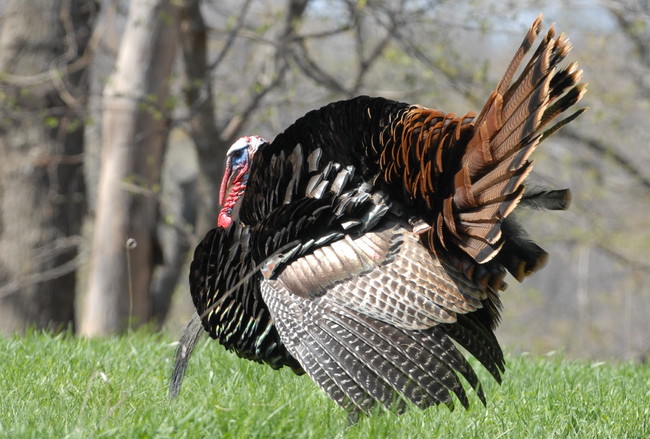 Not all turkeys gobble. - It's just a dude thing. Male turkeys "gobble to announce themselves to females which are called "hens" and compete with other males. Other turkey sounds include "purrs," "yelps" and "kee-kees."
Not all turkeys gobble. - It's just a dude thing. Male turkeys "gobble to announce themselves to females which are called "hens" and compete with other males. Other turkey sounds include "purrs," "yelps" and "kee-kees." -
2.
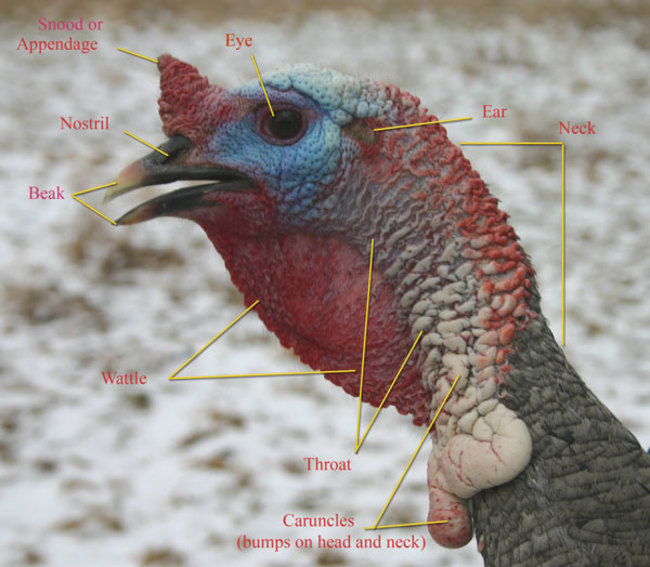 Turkeys wear a lot of cranial accessories. - An adult gobbler has a beard of modified feathers on his breast that reaches seven inches or more long, and has sharp spurs on his legs for fighting. A hen is smaller, weighing around 8 to 12 pounds, and has no beard or spurs. Both genders have a snood a dangly appendage on the face, wattle the red dangly bit under the chin, caruncles, and only a few feathers on the head.
Turkeys wear a lot of cranial accessories. - An adult gobbler has a beard of modified feathers on his breast that reaches seven inches or more long, and has sharp spurs on his legs for fighting. A hen is smaller, weighing around 8 to 12 pounds, and has no beard or spurs. Both genders have a snood a dangly appendage on the face, wattle the red dangly bit under the chin, caruncles, and only a few feathers on the head. -
3.
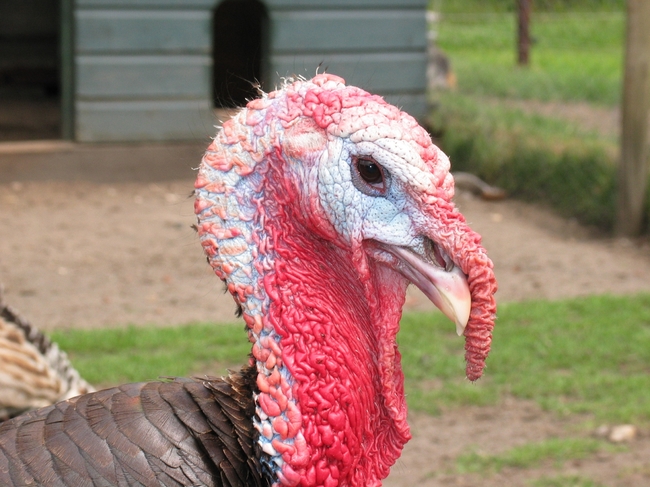 For turkeys, snood size matters. - Studies have shown that snood length is associated with male turkey health. It also gets them laid. A 1997 study in the Journal of Avian Biology found that female turkeys prefer males with long snoods and that snood length can also be used to predict the winner of a competition between two males. Just like hipster beards.
For turkeys, snood size matters. - Studies have shown that snood length is associated with male turkey health. It also gets them laid. A 1997 study in the Journal of Avian Biology found that female turkeys prefer males with long snoods and that snood length can also be used to predict the winner of a competition between two males. Just like hipster beards. -
4.
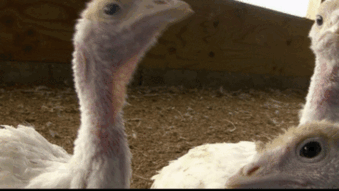 Turkeys are a physiological marvel. - They have great hearing, even without external ears. They also have an amazing 360 degree field of vision and are able to see in color. A part of the turkeys stomach, the gizzard, contains tiny stones to aid in digestion.
Turkeys are a physiological marvel. - They have great hearing, even without external ears. They also have an amazing 360 degree field of vision and are able to see in color. A part of the turkeys stomach, the gizzard, contains tiny stones to aid in digestion. -
5.
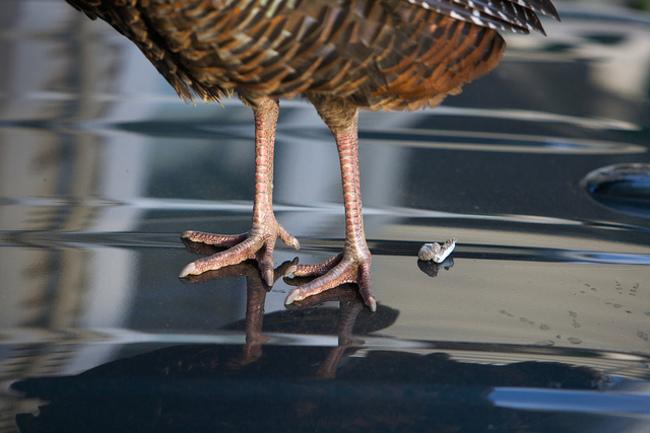 All turkey poop is not created equal. - Did you know a turkeys gender can be determined from its droppings? Males produce spiral-shaped poop and females poop is shaped like the letter J.
All turkey poop is not created equal. - Did you know a turkeys gender can be determined from its droppings? Males produce spiral-shaped poop and females poop is shaped like the letter J. -
6.
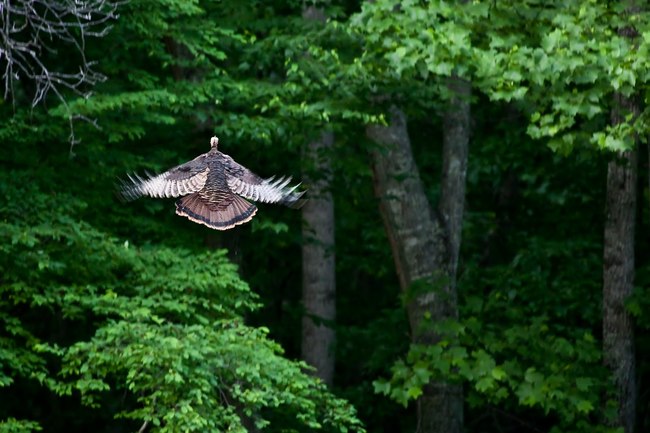 Turkeys are not sitting ducks. - Wild turkeys can run at speeds of up to 25 miles per hour and fly as fast as 40 miles per hour. They can also glide without flapping their wings for almost a mile. They know how to swim, too. If we didn't imprison domestic turkeys in jailhouse pens, they'd probably be much harder to catch.
Turkeys are not sitting ducks. - Wild turkeys can run at speeds of up to 25 miles per hour and fly as fast as 40 miles per hour. They can also glide without flapping their wings for almost a mile. They know how to swim, too. If we didn't imprison domestic turkeys in jailhouse pens, they'd probably be much harder to catch. -
7.
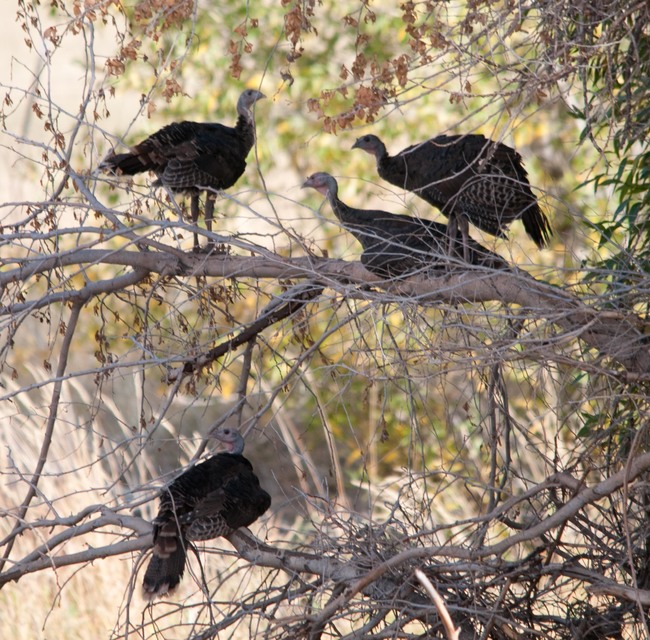 Wild turkeys sleep in trees. - Getting off the ground keeps them safe from predators, like coyotes, foxes and raccoons. Turkey flocks prefer to sleep together in one tree, and when they wake up, they yelp softly before jumping down. This allows them to make sure that the rest of the roosting group is okay after a night of not seeing or hearing one another.
Wild turkeys sleep in trees. - Getting off the ground keeps them safe from predators, like coyotes, foxes and raccoons. Turkey flocks prefer to sleep together in one tree, and when they wake up, they yelp softly before jumping down. This allows them to make sure that the rest of the roosting group is okay after a night of not seeing or hearing one another. -
8.
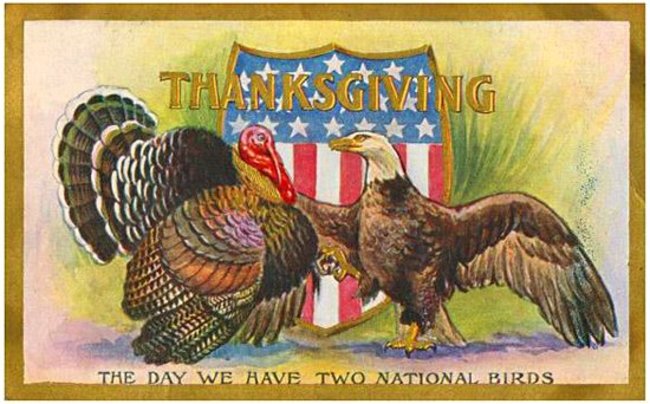 No, the turkey was not in the running for national bird. - Benjamin Franklin never proposed the turkey as a symbol for America. What he did was write a letter to his daughter in which he praised the turkey as being "a much more respectable bird" than the bald eagle. Bald eagles frequently scavenge on the bodies of dead animals, and steal food from each other and other predators. Ben dont play that.
No, the turkey was not in the running for national bird. - Benjamin Franklin never proposed the turkey as a symbol for America. What he did was write a letter to his daughter in which he praised the turkey as being "a much more respectable bird" than the bald eagle. Bald eagles frequently scavenge on the bodies of dead animals, and steal food from each other and other predators. Ben dont play that. -
9.
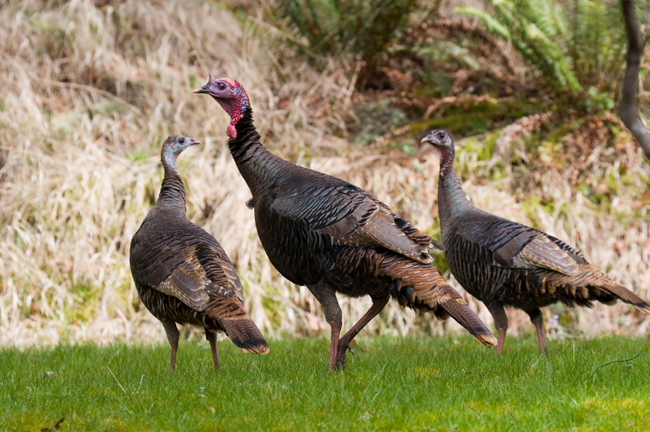 Turkeys have BFFs. - Turkeys are intelligent and sensitive animals that are highly social. They create lasting social bonds with each other and are very affectionate rather similar to dogs.
Turkeys have BFFs. - Turkeys are intelligent and sensitive animals that are highly social. They create lasting social bonds with each other and are very affectionate rather similar to dogs. -
10.
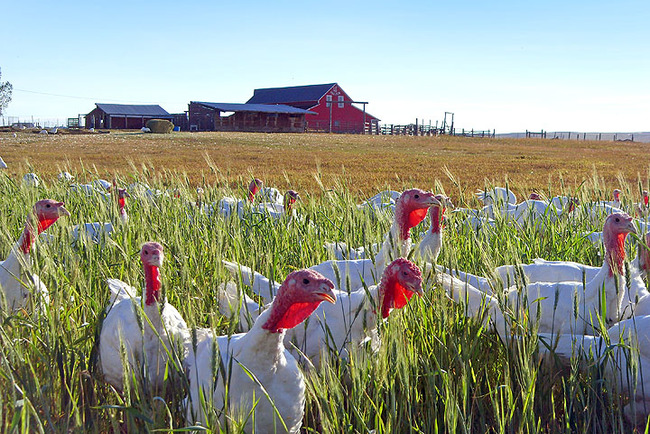 Turkeys have never have to ask for directions. - The wild turkey has outstanding geography skills. They have the ability to learn the precise details of an area over 1,000 acres in size.
Turkeys have never have to ask for directions. - The wild turkey has outstanding geography skills. They have the ability to learn the precise details of an area over 1,000 acres in size. -
11.
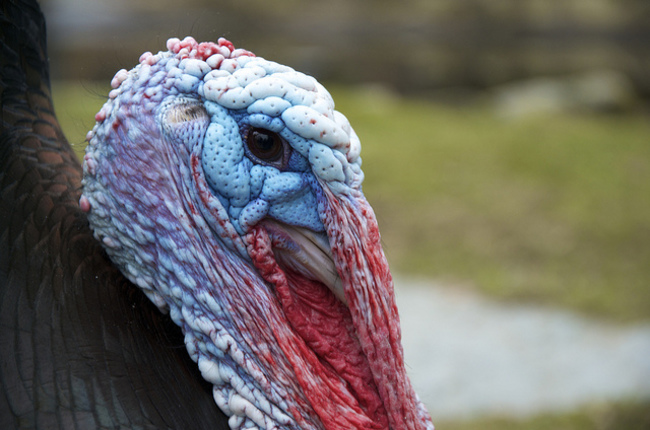 Turkeys are terrible at poker. - The area of bare skin on a turkey's throat and head vary in color depending on what it's feeling at the time. When excited, a male turkey's head turns blue, when ready to fight it turns red.
Turkeys are terrible at poker. - The area of bare skin on a turkey's throat and head vary in color depending on what it's feeling at the time. When excited, a male turkey's head turns blue, when ready to fight it turns red. -
12.
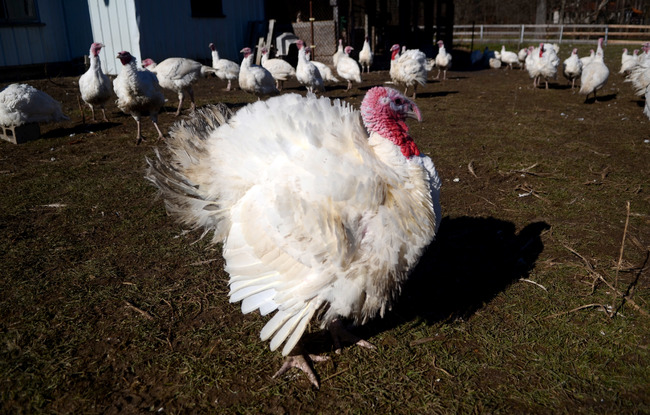 Every turkey you've ever drawn is wrong. - The turkey we eat doesn't look like the colorful turkeys we made in elementary school. The Large White or Broad-Breasted White is what most consumers find at the grocery store. They're bred for their white plumage because white feathers don't discolor the skin as dark feathers do.
Every turkey you've ever drawn is wrong. - The turkey we eat doesn't look like the colorful turkeys we made in elementary school. The Large White or Broad-Breasted White is what most consumers find at the grocery store. They're bred for their white plumage because white feathers don't discolor the skin as dark feathers do. -
13.
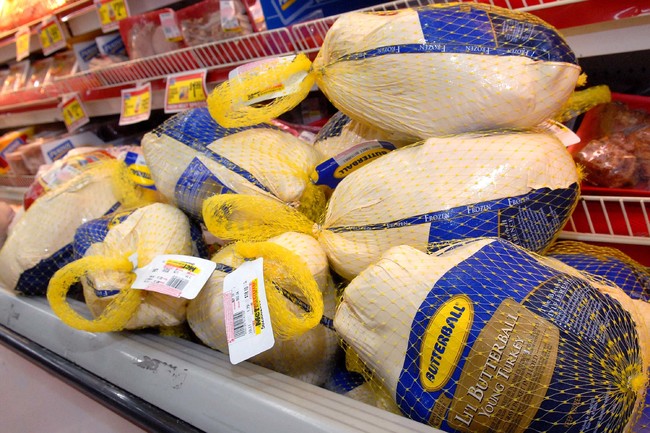 Americans go bananas for turkey. - Americans consume about 46 million turkeys on Thanksgiving, which is more than we eat on Christmas and Easter combined. The rest of the year, turkey sits in 4th place behind beef, pork, and chicken.
Americans go bananas for turkey. - Americans consume about 46 million turkeys on Thanksgiving, which is more than we eat on Christmas and Easter combined. The rest of the year, turkey sits in 4th place behind beef, pork, and chicken. -
14.
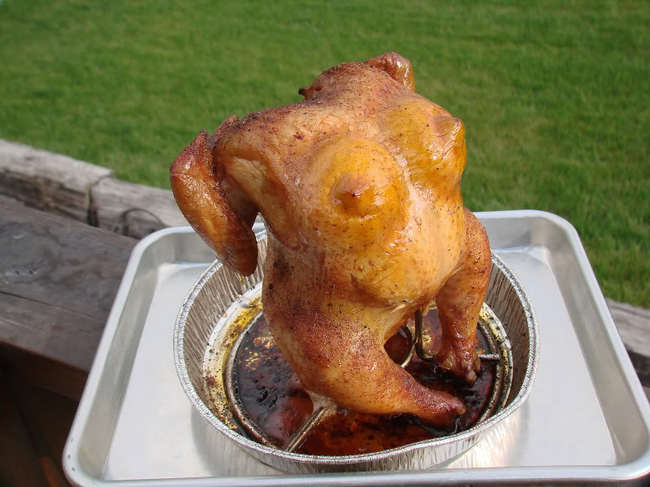 The turkey on your dinner table is a mutant. - Domestic turkeys have been bred to have enormous breasts to make them more appealing to Americans who are obsessed with white meat. According to United Poultry Concerns, factory-farmed turkeys grow so quickly that if a seven-pound human baby grew at the same rate, the infant would weigh 1,500 pounds at just 18 weeks of age. As a result, these top-heavy birds have terrible leg problems and are unable to fly like their wild counterparts.
The turkey on your dinner table is a mutant. - Domestic turkeys have been bred to have enormous breasts to make them more appealing to Americans who are obsessed with white meat. According to United Poultry Concerns, factory-farmed turkeys grow so quickly that if a seven-pound human baby grew at the same rate, the infant would weigh 1,500 pounds at just 18 weeks of age. As a result, these top-heavy birds have terrible leg problems and are unable to fly like their wild counterparts. -
15.
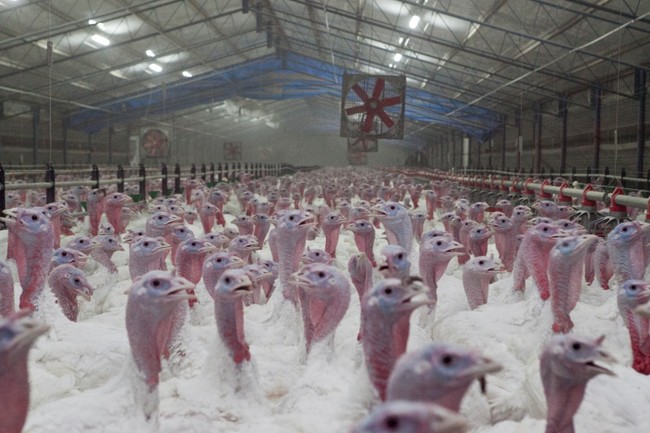 Turkeys freak out in crowds. - When they get spooked, they run for cover, an instinct that is useful in the wild, but is impossible in crowded pen conditions. In factory farming operations, each 20 lb bird has only about 3.5 square feet of space to move around. This means that when commercially raised turkeys get scared, they head to one place and pile up, smothering the ones that end up on the bottom.
Turkeys freak out in crowds. - When they get spooked, they run for cover, an instinct that is useful in the wild, but is impossible in crowded pen conditions. In factory farming operations, each 20 lb bird has only about 3.5 square feet of space to move around. This means that when commercially raised turkeys get scared, they head to one place and pile up, smothering the ones that end up on the bottom. -
16.
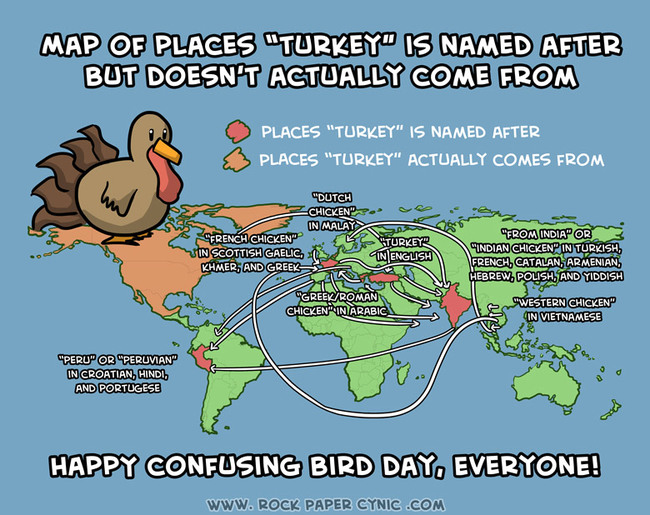 Turkey the food is named after Turkey the country. Kinda. - Legend has it that the turkey could have also been African guinea fowl made it to Europe in the Middle Ages via Turkey and thus became known as the "Turkey bird." When the first European visitors to America saw the native bird, the similarities were striking. Too lazy to come up with a new name, they just started calling it turkey.
Turkey the food is named after Turkey the country. Kinda. - Legend has it that the turkey could have also been African guinea fowl made it to Europe in the Middle Ages via Turkey and thus became known as the "Turkey bird." When the first European visitors to America saw the native bird, the similarities were striking. Too lazy to come up with a new name, they just started calling it turkey. -
17.
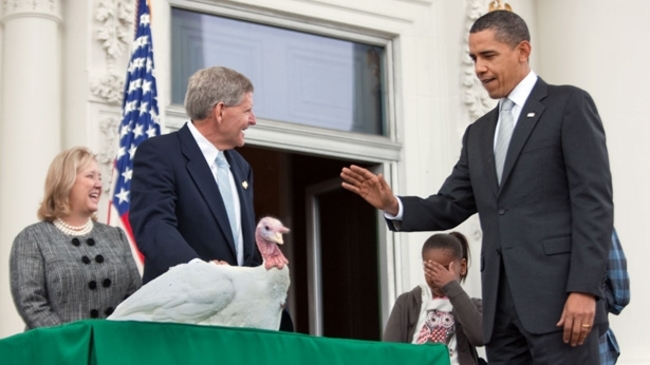 Pardoned turkeys don't live happily every after. - Every year since 1947, the President and Vice President of the United States have pardoned two domestic turkeys from their fate as oven fodder. It's a tradition that somehow makes us feel less guilty for killing 40 million of them. However, domestic birds are bred to be eaten, not frolic in a pasture. Their poor health means the spared birds usually die of natural causes in a year or so.
Pardoned turkeys don't live happily every after. - Every year since 1947, the President and Vice President of the United States have pardoned two domestic turkeys from their fate as oven fodder. It's a tradition that somehow makes us feel less guilty for killing 40 million of them. However, domestic birds are bred to be eaten, not frolic in a pasture. Their poor health means the spared birds usually die of natural causes in a year or so. -
18.
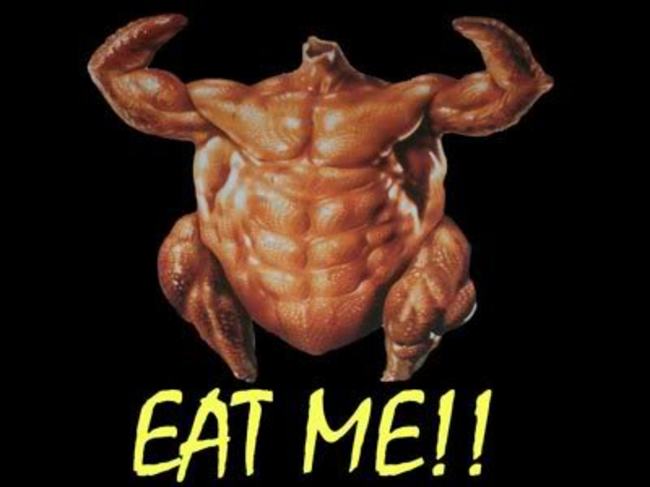 November is not National Turkey Month. - Though it defies all logic, June is "National Turkey Lovers Month." Get it together people.
November is not National Turkey Month. - Though it defies all logic, June is "National Turkey Lovers Month." Get it together people. -
19.
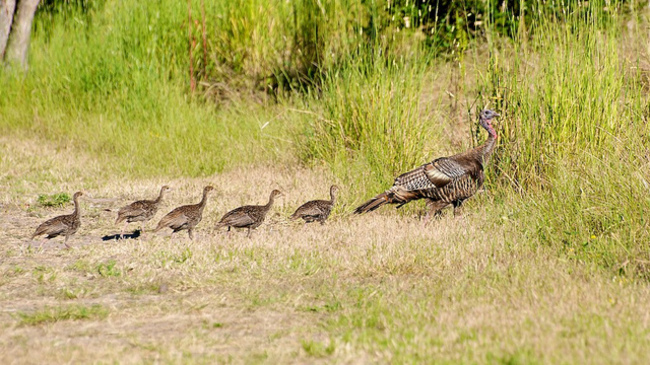 The more turkeys, the merrier.- A group of turkeys can be correctly called several awesome things, including a "crop, "dole, "gang, "posse, and "raffle." A baby turkey is called a "poult" or "chick." A young male turkey is called a "jake" and a young female is called a "jenny."
The more turkeys, the merrier.- A group of turkeys can be correctly called several awesome things, including a "crop, "dole, "gang, "posse, and "raffle." A baby turkey is called a "poult" or "chick." A young male turkey is called a "jake" and a young female is called a "jenny." -
20.
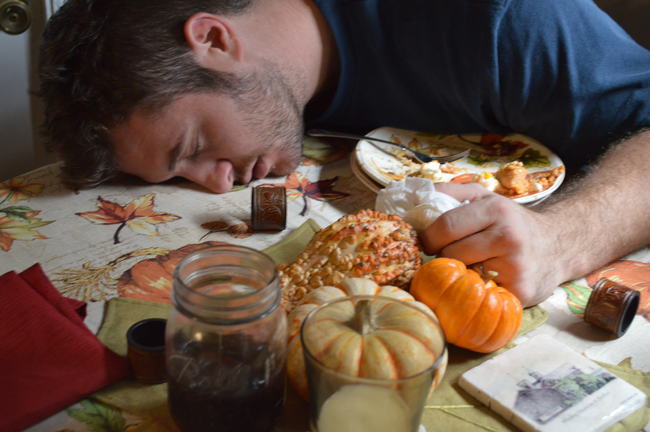 Eating turkey is NOT the reason you pass out after Thanksgiving dinner. - Yes, turkey contains the amino acid tryptophan, which is a precursor for serotonin, a brain chemical that makes us relaxed and sleepy. A tiny, tiny amount of tryptophan. You could have seconds or even thirds of turkey and still not consume enough tryptophan to make yourself drowsy. That open-pants nap your Dad takes after dinner is more accurately attributed to the enormous number of calories aka carbs, fat and sugar eaten at once. Stop blaming the turkey, piggies.
Eating turkey is NOT the reason you pass out after Thanksgiving dinner. - Yes, turkey contains the amino acid tryptophan, which is a precursor for serotonin, a brain chemical that makes us relaxed and sleepy. A tiny, tiny amount of tryptophan. You could have seconds or even thirds of turkey and still not consume enough tryptophan to make yourself drowsy. That open-pants nap your Dad takes after dinner is more accurately attributed to the enormous number of calories aka carbs, fat and sugar eaten at once. Stop blaming the turkey, piggies.


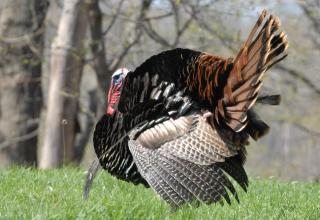






0 Comments